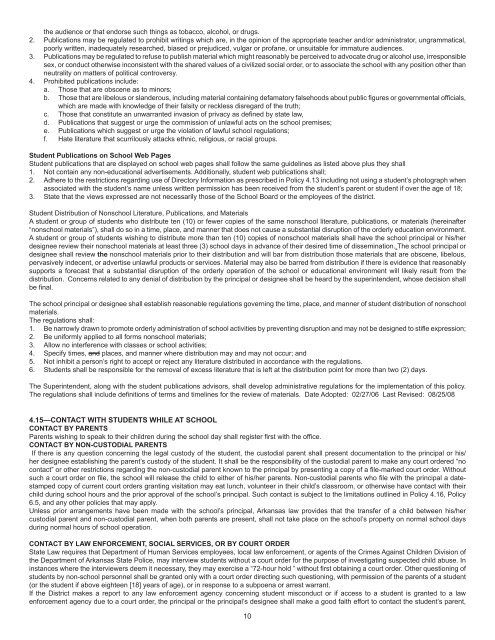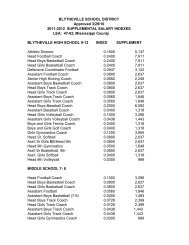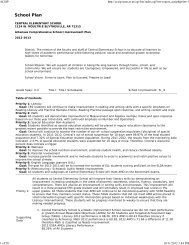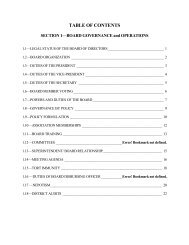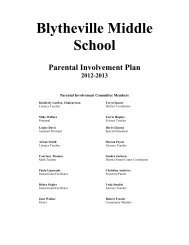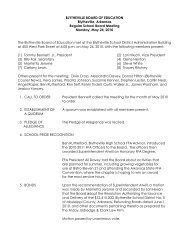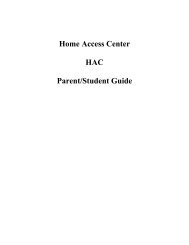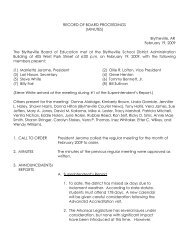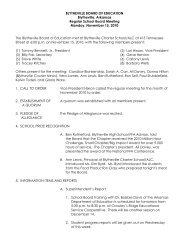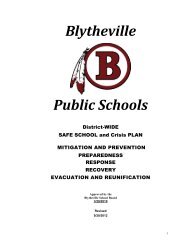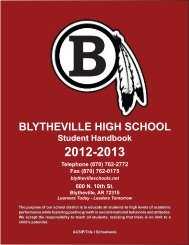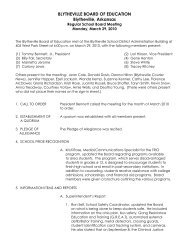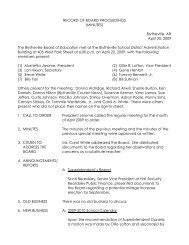Student Handbook - Blytheville Public Schools
Student Handbook - Blytheville Public Schools
Student Handbook - Blytheville Public Schools
Create successful ePaper yourself
Turn your PDF publications into a flip-book with our unique Google optimized e-Paper software.
the audience or that endorse such things as tobacco, alcohol, or drugs.<br />
2. <strong>Public</strong>ations may be regulated to prohibit writings which are, in the opinion of the appropriate teacher and/or administrator, ungrammatical,<br />
poorly written, inadequately researched, biased or prejudiced, vulgar or profane, or unsuitable for immature audiences.<br />
3. <strong>Public</strong>ations may be regulated to refuse to publish material which might reasonably be perceived to advocate drug or alcohol use, irresponsible<br />
sex, or conduct otherwise inconsistent with the shared values of a civilized social order, or to associate the school with any position other than<br />
neutrality on matters of political controversy.<br />
4. Prohibited publications include:<br />
a. Those that are obscene as to minors;<br />
b. Those that are libelous or slanderous, including material containing defamatory falsehoods about public figures or governmental officials,<br />
which are made with knowledge of their falsity or reckless disregard of the truth;<br />
c. Those that constitute an unwarranted invasion of privacy as defined by state law,<br />
d. <strong>Public</strong>ations that suggest or urge the commission of unlawful acts on the school premises;<br />
e. <strong>Public</strong>ations which suggest or urge the violation of lawful school regulations;<br />
f. Hate literature that scurrilously attacks ethnic, religious, or racial groups.<br />
<strong>Student</strong> <strong>Public</strong>ations on School Web Pages<br />
<strong>Student</strong> publications that are displayed on school web pages shall follow the same guidelines as listed above plus they shall<br />
1. Not contain any non-educational advertisements. Additionally, student web publications shall;<br />
2. Adhere to the restrictions regarding use of Directory Information as prescribed in Policy 4.13 including not using a student’s photograph when<br />
associated with the student’s name unless written permission has been received from the student’s parent or student if over the age of 18;<br />
3. State that the views expressed are not necessarily those of the School Board or the employees of the district.<br />
<strong>Student</strong> Distribution of Nonschool Literature, <strong>Public</strong>ations, and Materials<br />
A student or group of students who distribute ten (10) or fewer copies of the same nonschool literature, publications, or materials (hereinafter<br />
“nonschool materials”), shall do so in a time, place, and manner that does not cause a substantial disruption of the orderly education environment.<br />
A student or group of students wishing to distribute more than ten (10) copies of nonschool materials shall have the school principal or his/her<br />
designee review their nonschool materials at least three (3) school days in advance of their desired time of dissemination. The school principal or<br />
designee shall review the nonschool materials prior to their distribution and will bar from distribution those materials that are obscene, libelous,<br />
pervasively indecent, or advertise unlawful products or services. Material may also be barred from distribution if there is evidence that reasonably<br />
supports a forecast that a substantial disruption of the orderly operation of the school or educational environment will likely result from the<br />
distribution. Concerns related to any denial of distribution by the principal or designee shall be heard by the superintendent, whose decision shall<br />
be final.<br />
The school principal or designee shall establish reasonable regulations governing the time, place, and manner of student distribution of nonschool<br />
materials.<br />
The regulations shall:<br />
1. Be narrowly drawn to promote orderly administration of school activities by preventing disruption and may not be designed to stifle expression;<br />
2. Be uniformly applied to all forms nonschool materials;<br />
3. Allow no interference with classes or school activities;<br />
4. Specify times, and places, and manner where distribution may and may not occur; and<br />
5. Not inhibit a person’s right to accept or reject any literature distributed in accordance with the regulations.<br />
6. <strong>Student</strong>s shall be responsible for the removal of excess literature that is left at the distribution point for more than two (2) days.<br />
The Superintendent, along with the student publications advisors, shall develop administrative regulations for the implementation of this policy.<br />
The regulations shall include definitions of terms and timelines for the review of materials. Date Adopted: 02/27/06 Last Revised: 08/25/08<br />
4.15—CONTACT WITH STUDENTS WHILE AT SCHOOL<br />
CONTACT BY PARENTS<br />
Parents wishing to speak to their children during the school day shall register first with the office.<br />
CONTACT BY NON-CUSTODIAL PARENTS<br />
If there is any question concerning the legal custody of the student, the custodial parent shall present documentation to the principal or his/<br />
her designee establishing the parent’s custody of the student. It shall be the responsibility of the custodial parent to make any court ordered “no<br />
contact” or other restrictions regarding the non-custodial parent known to the principal by presenting a copy of a file-marked court order. Without<br />
such a court order on file, the school will release the child to either of his/her parents. Non-custodial parents who file with the principal a datestamped<br />
copy of current court orders granting visitation may eat lunch, volunteer in their child’s classroom, or otherwise have contact with their<br />
child during school hours and the prior approval of the school’s principal. Such contact is subject to the limitations outlined in Policy 4.16, Policy<br />
6.5, and any other policies that may apply.<br />
Unless prior arrangements have been made with the school’s principal, Arkansas law provides that the transfer of a child between his/her<br />
custodial parent and non-custodial parent, when both parents are present, shall not take place on the school’s property on normal school days<br />
during normal hours of school operation.<br />
CONTACT BY LAW ENFORCEMENT, SOCIAL SERVICES, OR BY COURT ORDER<br />
State Law requires that Department of Human Services employees, local law enforcement, or agents of the Crimes Against Children Division of<br />
the Department of Arkansas State Police, may interview students without a court order for the purpose of investigating suspected child abuse. In<br />
instances where the interviewers deem it necessary, they may exercise a “72-hour hold ” without first obtaining a court order. Other questioning of<br />
students by non-school personnel shall be granted only with a court order directing such questioning, with permission of the parents of a student<br />
(or the student if above eighteen [18] years of age), or in response to a subpoena or arrest warrant.<br />
If the District makes a report to any law enforcement agency concerning student misconduct or if access to a student is granted to a law<br />
enforcement agency due to a court order, the principal or the principal’s designee shall make a good faith effort to contact the student’s parent,<br />
10


